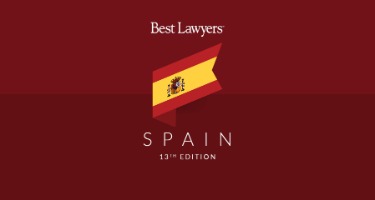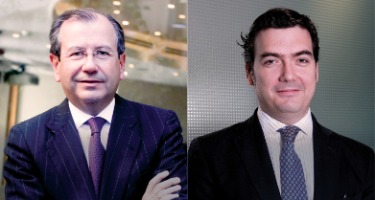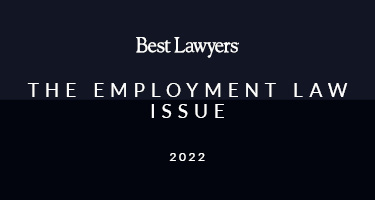For Spanish firm Garrigues, a “Law Firm of the Year” award-winner for Labor and Employment Law in 2019, running a successful firm means engaging the younger generation of lawyers and embracing the digital trends and technologies taking over the legal field. In an interview with Best Lawyers CEO Phillip Greer, partner Adriano Gómez explores some of his landmark cases and looks to the future of employment law in Spain.
What achievements are you most proud of for your firm this last year in Labor and Employment Law?
For one, we've been taking care of around 33 different restructuring processes, which would include some of the most complex ones lately carried out in Spain. We have also led negotiations of other kinds, such as collective negotiations of bargaining agreements. Here, we've been assisting many major companies. As refers to collective bargaining agreements, we have provided assistance to many different sectors and companies. Moreover, we've been assisting our clients in all sort of litigation proceedings, involving either class actions or individual claims, at all sort of court levels.
I think that one of the reasons we received this award would have to do with the fact that we tend to provide the broadest advice in the labor field. On the contrary to what may happen with the employment teams of other full-service firms, we do not only deal with transactional employment law, but concentrate a great deal of our work on collective negotiation, restructuring, and litigation. We tend to cover anything and everything pertaining to employment law.
Besides, we are approximately 200 lawyers (including more than 30 partners) exclusively devoted to all fields of labor and employment law.
We look for people who are eager to work in a dynamic, innovative and international environment.
Can you tell me about one or two of your landmark cases?
Perhaps it has to do with the publicity it has had in the media, but I would point to the Alcoa case. Alcoa is a big multinational company in the aluminum industry. It decided to close down two sites in the north of Spain. It gave rise to a lot of trouble with the negotiation of political parties when trade unions were pressing the company to stop its restructuring process, which unfortunately was absolutely needed. It gave rise to a very difficult and tense situation, which implied initially that the unions did not want to sit down on the negotiation table. Finally, after a hard negotiation, an agreement was waged.
An injunction was then brought into Rotterdam Court. Since trade unions understood and defended that the company had failed to comply with information and consultation duties of the European Workers Council of the multinational. And they tried to use it to stop this procedure. We had to defend the case in Rotterdam, explaining that no breach of procedural law had taken place. And we succeeded there. It was quite an interesting case, which had an international reach.
We have also been recently involved in Vodafone’s restructuring process in Spain (impacting 1.100 employees), reaching an agreement with trade unions in a complex case, where the Company has managed to adapt its business to the new market trends, seeking a more simplified organizational model.
We have assisted DIA Group on its restructuring process which involved two of its companies, and which initially impacted up to 2,100 job positions (although was finally reduced down to, approximately, 1700).
We also make reference to the NISSAN case, led by our Garrigues Barcelona team, where we have driven the restructuring process carried out impacting 600 employees, out of which 450, would be terminated through early retirements. As part of the restructuring process, we negotiated the Collective Bargaining Agreement, which affects 3,000 employees, and which envisages salary freeze for 2018 and 2019.
[RELATED: See the latest edition of The Best Lawyers in Ukraine.]
Your firm consistently has been recognized for its dedication to finding and fostering young talent. How do you seek out new talent for your team and what are you looking for when considering hiring a young attorney?
We try to hire our new people based on the most prestigious universities. We also deal and try to consider lateral hires whenever that's needed, if there's a position, depending on the skills we may be in a certain moment in need of. We also run a study center that provides post-degree studies, which are different in nature for banking services, employment law, corporate law, etcetera. There, we find people who match the skills and profile we are looking for with a high degree of technical knowledge.
We also try to recruit people with, nowadays, at least two languages on top of Spanish. And obviously with high digital skills if possible. We are proud of being at the forefront in terms of digital tools offered to our professionals and clients, as well as innovation at the working place. We look for people who are eager to work in a dynamic, innovative and international environment.
We also try to consider people who have flexibility in terms of working, and who are impassioned. Our ideal candidate has an emotional approach to the client and can understand easily the client needs, and not only gets along with the client, but also looks for the best solution from a purely practical way not only a purely theoretical one. We want someone who not only works well from a team perspective but also may have leadership skills for the future, for our firm.
We also consider ways to engage a millennial workforce. New generations are thinking more about the balance of work and personal life. We are trying to encourage there as much flexibility as possible in terms of work. Allowing different formulas that may help to achieve that sort of balance for our attorneys.
What are your thoughts about the rise of self-employed workers and the legislation that has been passed to protect them? Could this trend affect other areas of Labor and Employment laws in Spain?
There's legislation which came into force approximately 10 years ago ruling contractual relationships with self-employed workers who are economically dependent. It refers to services which would be in a mid-situation between ordinary employees, and self-employed workers. Spain has tried to give more protection to self-employees. I think this is something that indeed is good for the market and will probably help increase the number of self-employees there are in the future in Spain.
The main challenge I think we'll have in the future is perhaps adapting ourselves to the new changes coming from countries such as yours, or even from Poland or the United Kingdom with digital platforms. This is something that indeed is promoting more work and which still is difficult to adapt to our current legal frame. This is an unstoppable market trend our mindset needs to become adapted to , since the economy is demanding so. And it will be very interesting for the coming years to see how the Spanish lawmaker wants to adapt to it.
Have there been any important policy changes locally or abroad that are impacting Labor and Employment Law?
Yes. Our Government has introduced several measures aimed at encouraging family and work conciliation. New legislation on data protection which has recently come into force is also a hot topic which surely impacts Labor and Employment Law. Together with this, whistle-blowing policies have also been the subject of new legislation, this was a field which was not so well covered in the past and it is still, in my understanding, needs to be developed in more detail in the future.
Is there anything else you'd like to share with me about your firm either for this practice area or for other groups the firm's particularly proud of?
We are certainly proud of our area, which is headed by partner Rosa Zarza, who is well reputed among the profession. We are proud of being recognized and well considered among our peers, authorities, and tribunals. I think we're also respected by our counterparts, by trade unions. Several of our partners stand out for their skills in the different areas of Labor & Employment Law (either restructuring, collective negotiation, litigation, pensions or transactional work).
These indeed have provided us with a complete approach to all possible needs the client may have.
































